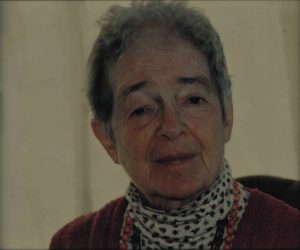Olga Umansky, MLIS, is a librarian and archivist of the Hanns Sachs Library at BPSI. Her remarks below originally appeared in the Winter 2022 issue of the library newsletter, which can be read here.
Veronica Benedek Tisza (or Vera, as friends and colleagues called her) was a prominent child psychiatrist, training director of the psychiatry department at the Tufts Floating Hospital in Boston, and a beloved supervisor of many young child analysts at the Boston Psychoanalytic Society and Institute.

Born in Szeged, Hungary on August 7, 1912, she completed her medical training in the Budapest of Sandor Ferenczi and Imre Hermann, but was not particularly interested in psychoanalysis during her youth. On one of her summer trips to Vienna in 1934, right after the assassination of the Chancellor of Austria Engelbert Dollfuss, she remarked on the change of political climate (as she put it in her interview, people walked the streets without “Gemutlichkeit”) and decided to start an application process for a US visa. In her interview to Sanford Gifford, Vera Tisza says she knew about “the mousetrap” and what was going on in Europe from the German newspapers she read in the Budapest library. Vera’s uncle lived in the US, but she had three more years of medical school to complete, so she stayed in Budapest until her graduation in 1937. Her fianceé, Laszlo Tisza, studied in Paris, so Vera first obtained an exit visa to join him in France. She got a job at the Paris hospital where a resident doctor, colleague of Piaget, Julian Ajuriaguerra, got her interested in child psychiatry. When the Nazis occupied Paris in 1940, the couple fled to Toulouse with the help of a Jewish French mathematician, Jacques Hadamard, who drove his family and the Tiszas to the Pyrenees in his car. (Hadamard obtained a visa to the US in 1941, briefly taught at Columbia, returned to France in 1945, and continued his career in mathematics. Among his many contributions in number theory, complex analysis, differential geometry, and partial differential equations is a book Psychology of Invention in the Mathematical Field published in 1945).
After many travails in the South of France (being poor and cold and not welcomed), Spain (where they could finally eat “lots of almonds” and take a bath), and Portugal (beautiful and warm), the Tiszas finally got their US visas and, after a 15-day trip on a boat, arrived in New York in March 1941. Vera commented on their alienation from other fellow Jewish refugees who told them “if you don’t speak Yiddish, you are not Jewish.” She also said she did not remember “being ever that cold,” as they only had summer clothes throughout the journey. Her American friend and the Quakers graciously gave them coats and sweaters.
Vera started her American career as a Floating Hospital pediatrician, then got her psychiatric training at MGH and the Judge Baker Children’s Center, and finally went to Pittsburgh to complete her psychoanalytic training. BPSI Member Malkah Notman, MD remembers Vera Tisza as an innovative clinician: “she started a Floating hospital program where kids who could be ambulatory were allowed to get out of bed and socialize with other kids. That may have been the first such program in Boston.” Karen Smolens remembers meeting Dr. Tisza shortly after she began working at BPSI: “Dr. Tisza was an active member of the Boston Center for Adult Education’s Retired Persons Association and their weekly current events discussion group. My father was the President of the group and introduced me to Dr. Tisza one day when I stopped by on my lunch hour. I told her that I recently started working at BPSI. She was already retired, but I remember her being very warm and gracious. I saw her a few more times, and she would always ask how things were going at 15 Commonwealth Ave.” She is known for her longitudinal studies resulting in several papers on children with cleft palate, observation of children in hospitals, an article on the training of a child psychiatrist, and her last published important paper The Sexually Misused Child (1977).
References:
- Brandt, R., & Tisza, V. (1977). The Sexually Misused Child. American Journal of Orthopsychiatry, 47, 80-90.
- Gifford, S. (1991, December 4). Veronica Tisza: Obituary. Gifford Papers, BPSI Archives.
- Gifford, S. (1988, November 16, 19). Vera Tisza’s Interview. Oral History Transcripts, BPSI Archives.
- Hadamard, Jacques Salomon, (1865-1963). Wikipedia Entry.
- Tisza VB. (1975). Training the child psychiatrist. Views from a training director. Journal of the American Academy of Child Psychiatry, 14(2), 204-209.
- Tisza, VB. Bibliography on PubMed.
Olga Umansky can be contacted by email here.
***
The opinions or views expressed on the Boston Psychoanalytic Society & Institute (“BPSI”) social media platforms, including, but not limited to, blogs, Facebook posts and Twitter posts, represent the thoughts of individual contributors and are not necessarily those of the Boston Psychoanalytic Society & Institute or any of its directors, officers, employees, staff, board of directors, or members. All posts on BPSI social media platforms are for informational purposes only and should not be regarded as professional advice.
BPSI does not control or guarantee the accuracy, relevance, timeliness or completeness of information contained in its contributors’ posts and/or blog entries, or found by following any linked websites. BPSI will not be liable for any damages from the display or use of information posted on its website or social media platforms. BPSI cannot and does not authorize the use of copyrighted materials contained in linked websites.

